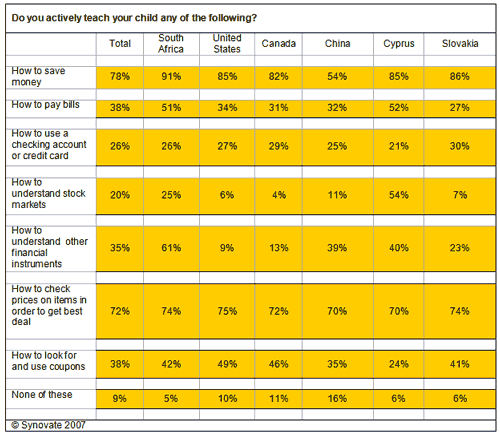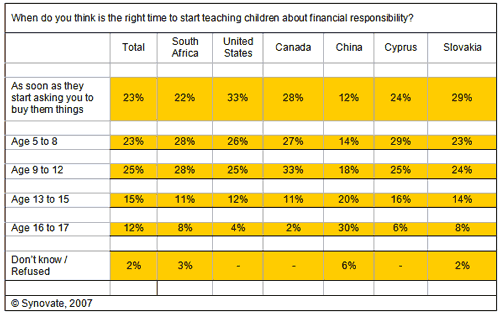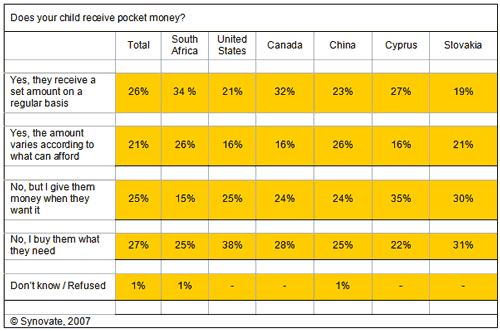
Teaching children financial responsibility
These and other fascinating insights come from a survey of 1,596 parents of 5 to 17 year olds in South Africa, the United States, Canada, China, Cyprus and Slovakia, who were asked whether they give their children pocket money and how they are teaching them about financial responsibilities.
Most parents surveyed globally believe it’s important that children learn about financial responsibility, with 78 percent teaching them how to save money and 72 percent showing children how to compare prices to get the best deal. This financial education can get pretty sophisticated, with one-quarter of parents globally showing their children how to use a checking account or credit card. 54 percent of Cypriot parents teach their kids about the stock market!

79 percent of South African children play no part in saving for their education. On the other hand, forty-three percent of parents involve their children in saving for their education, with Chinese and Cypriot children (60 and 55 percent respectively) topping that list.
For some parents, it’s never too early to begin teaching children about financial responsibility: 23 percent of those surveyed do so as soon as their children start asking their parents to buy things for them, while another 23 percent begin their children’s financial education between the ages of 5 and 8. The majority of South African parents believe that children should start being educated between the ages of 5 and 12. In China, however, half of parents wait until their children are 13 or older before teaching them about finances.

So how does all this affect children’s pocket money? Parents across those countries are almost evenly divided on whether they give their children a regular allowance. South African and Canadian children are most likely to receive a set amount, according to 34 and 32 percent of parents respectively. By contrast, 26 percent of Chinese parents give their children whatever amount they can afford as pocket money. However, 38 percent of American parents prefer to just buy their children what they need, while 35 percent of Cypriot children simply get money when they want it.

36 percent of South African allow their children to spend their pocket money however they wish, while 39 percent state that they give input into what their children spend money on, but that their children have the final say. By contrast, almost two thirds of Slovakian parents and 42 percent of Cypriot parents are happy to let their children spend their money any way they like.
Most South African children (52 percent) do not have to do chores / work to receive their pocket money. This is compared to 96% of children in the US who do have to earn their allowance. At the other end of the scale, a large majority of children in Cyprus (89 percent), China (77 percent) and Slovakia (75 percent) don’t have to lift a finger for their pocket money.
CURIOSITIES
> If they can afford it, South African and Cypriot and parents are more likely to buy an expensive item that their children desperately want.
> 69 percent of Canadian parents, and 66 percent of American ones, do not involve their children in saving for their own education.
> 30 percent of Slovakian parents – more than their counterparts in any other country surveyed – teach their children how to use a checking account or credit card.
- Unlocking the value of creativity in advertising: How to bridge the creativity gap15 Apr 13:47
- 4 habits keeping your brand poor26 Mar 16:08
- Understanding consumer mindsets for growth in 202407 Mar 08:52
- South Africa's unemployment nightmare: The burden on its people09 May 10:05
- Global survey shows shrinking trust in internet29 Nov 10:17












